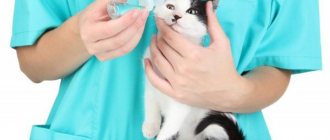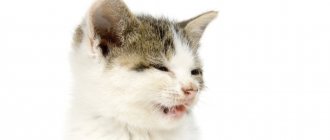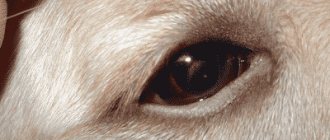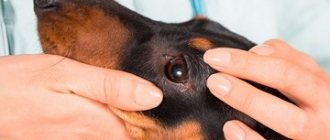How to examine a cat if its eyes are watery?
- As tragic as it may be, often the appearance of tears in a cat’s eyes indicates the presence of some kind of disease.
- Therefore, you need to pay attention to whether tears appeared for a short time and then disappeared, or whether the discharge in your cat’s eyes is present throughout the entire day, or worse, several days.
Tears
- If the cat’s tears are insignificant, and, having appeared in the morning, soon went away, there is nothing to worry about, and there is no reason for alarm.
- If your eyes “cry” for a long time, you should look for the cause of this phenomenon.
- When examining a cat with watery eyes, start by cleaning your hands to avoid further infection. Then try pulling down the upper eyelids on each eye .
- If the eyes are not cloudy, they shine, and the pupils are the same size, and the back surface of both eyelids is pale pink, and the cornea is transparent - everything is normal with the animal’s eyes.
Examine the animal
- If the eyelids are red or swollen, or the cornea is cloudy, this means that the cat has problems with the eyes.
- If the animal has difficulty opening its eyes or the inner surface of the eyelid is pulled up by a thin light film, it is better to visit a veterinarian as soon as possible.
Cat's eyes are watery: causes and treatment
Reasons why a cat's eyes water:
- with a foreign body in the eyes . It could be some kind of speck, fluff, twig, midge, and possibly dirt. If you find something like this, the first thing you should do is rinse the animal’s eyes under running water. Once the foreign object has been washed, apply 1% tetracycline ointment to the cat's upper eyelid . It would be a good idea to show the animal to a veterinarian.
- Weakening of the immune system . This is possible if the kitten is taken away from its mother too early. But only a veterinarian can find out whether this is so. He will also develop a regimen for taking the necessary medications and adjust the animal’s diet.
- The presence of allergies , which, just like people, are inherent in cats. Allergens can be the same as for humans: dust, chemicals, pollen, etc. Here, consultation with a specialist is also necessary, since it is unlikely that the owner himself will be able to accurately determine both the allergy itself and the cause of its occurrence.
- Worms . This is a very common cause of watery eyes in cats. To exclude such a cause, the animal should be regularly treated for worms.
- Breed cats. There are several breeds that have a characteristic skull structure with a flattened nose and deformed nasolacrimal ducts. Only daily eye rinsing and special attention to hygiene in these risky areas will help.
Prone to watery eyes - Colds . If the cat also sneezes and coughs, sleeps most of the time and absorbs a lot of water, there is reason to suspect a cold . You should not treat the animal yourself; it is better to contact a veterinarian.
- Feline distemper is accompanied, in addition to discharge from the eyes, often with pus, high fever, diarrhea and vomiting, and general weakness. Self-treatment is unacceptable.
Reasons why a cat's eyes are watery
Let's consider the first option, when lacrimation is not a disease
Why might there be a problem with the organs of vision if the animal is healthy?
There are several good reasons for this:
- Unsuitable diet for your cat.
- There are breeds, for example, Scottish, in which the structure of the muzzle, in particular the tear duct, is such that it seems that the cat’s eye is constantly leaking.
- The cat slept for a long time, and as a result a similar problem may arise.
- The cat does not have allergies, but some aggressive chemical components, hygiene products, detergents and detergents, medications, etc., can cause an allergic reaction, a sign of which will be discharge from the eyes.
All these cases are common occurrences. But this only indicates temporary discomfort for the murka. The reason will go away, the cat’s eyes will not run. These are tears. And you should not sound the alarm if it turns out that they have some unusual color, for example, slightly cloudy, reddish or grayish.
© shutterstock
At least you need to watch the cat for a while. If the reason that caused the problem goes away, or we neutralize it, and the kitten continues to “cry,” then, most likely, the pathogen is something else and the problem is much deeper.
Moreover, tears themselves do not look attractive. And even if the problem itself is only aesthetic, it needs to be solved. There are suitable and inexpensive methods and affordable means for this that can be found in every home.
Let's consider the second option, when if there are reasons why the cat's eyes may be watery, and she is actually sick. Which?
Here are the most common and widespread:
- Even a domestic cat can get parasites. And the eyes that flow show it.
- Any type and complexity of injury. The cat got into a fight and the enemy cut his eye, or our tomboy fell off the cabinet and hurt his head. These and other injuries can form the basis of a very complex process, which will lead to the fact that the eye begins to fester.
- Infectious inflammation of the conjunctiva is something that many of our pets encounter due to their free lifestyle or our inept handling of them.
- Bacteria and fungi. It is difficult to completely neutralize this reason. But it is possible to quickly cure the eyes of cats if you start the right treatment.
- Allergy. Did you know that our four-legged friends are very sensitive and all the products we use to clean our home are very harmful to them? But that’s not all; often, in pursuit of savings, we can harm our pet if we choose low-quality cat care products.
- Intolerance to certain medications also leads to the kitty developing a reaction where the eyes run.
- Blepharitis is inflammation of the eye. This disease can occur due to any type of injury: eyelid bruise, chemical burn, cut or tear. But it doesn't stop there. Further, the wound becomes infected due to the fact that viruses and microbes can freely enter the eye. The eye swells and begins to fester.
The reasons are all serious enough for you to start treating your cat without delay. After all, the point is not only in the appearance of the fluffy, but also in the fact that he feels great discomfort, his eye itches and itches. And when he starts scratching it, he makes the problem even worse. The wound does not shrink, but increases, which means the area of access to microbes and viral infections increases. And his paws are not that clean, which is how he spreads the infection.
Our decision to cure the cat has matured, and we want to do it quickly and without special expenses. This is why many decide to treat at home, armed with old antiquated remedies and Wikipedia, which should know everything . But there is a huge and significant minus in all this. Which? Think about it! Do you know exactly what caused your pet’s illness? We found out that there may be several reasons. But why exactly are your furry furry's eyes running?
© shutterstock
Even if it seems to you that you know exactly the answer to this question, then do not rush, for fear of harming your pet. It's best to be sure. To do this, you should consult a doctor.
Eye diseases that cause your cat's eyes to water
- Possible infection. If the eye becomes red and swollen, and pus appears, the help of a veterinarian is necessary, since feline conjunctivitis is possible.
- Direct eye disease , in particular cataracts or glaucoma . A whitened lens in the first case or a clouded cornea in the second are obvious symptoms of such diseases. Of course, treatment is only possible in a clinical setting.
- Diseases caused by viruses or fungi (such as chlamydia or toxoplasmosis) can only be treated by a specialist.
- An inflamed cornea is identified by red, watery eyes, on which a cloudy film appears.
- Entropion of the eyelid is often characteristic of Persians or, for example, sphinxes. Purulent discharge and swollen eyes are a reason to immediately visit a doctor.
- injury received if a cat got into a fight with a fellow cat, hit itself, got caught on a branch, etc. Wounds or other damage to the eyeball are symptoms of such an injury. It would be a good idea to consult a doctor to determine the severity of the injury.
From injury
You should also pay attention to the color of the discharge from the eyes.
- If the discharge is clear, similar to ordinary tears, it is most likely due to an allergy , mechanical irritation, or breed characteristics.
- If the discharge is green or yellow, mixed with pus , this indicates the presence of an infectious disease.
- If your cat's eyes are watery brown or red, it could be worms.
Why do Scottish Fold cats have watery eyes?
- As mentioned above, some cat breeds have a non-standard nasolacrimal duct, including Scottish, British, and Persian.
- Because of this, it does not completely remove the discharge, which is usually normal for any breed.
- The excess is eliminated through the eyes. If this happens after the cat has slept, then there is no need to worry, this is a normal physiological phenomenon.
Due to non-standard channel
- If your cat’s eyes are constantly watering , this is already outside the norm, and here it is necessary to find out the cause with the help of a veterinarian.
- Such cats need to wash at least once a week, and sometimes up to 2-3 times a day. If the discharge is normal, it is enough to wipe it periodically.
- If your eyes water frequently , you should contact a veterinarian and have your animal examined.
How to prevent your cat's eyes from watering?
- Of course, it would be much more correct to use hygienic methods so that the cat does not have to be treated later.
- Periodically rinse the animal's eyes with a cotton swab and warm water towards the spout.
Rinse
- If you notice dried discharge from the eye, soften it and carefully remove it, then use a clean swab to rinse the eye.
- Do not use the same tampon for both eyes, use new ones.
- If your cat's eyes are watery , do not use drops or medications without consulting a veterinarian, otherwise you may make the animal sick by using the medication incorrectly.
Other reasons
Watery eyes while eating are most often observed in old cats after 8 years of age, as well as in small kittens due to growth and development of the skull bones. The kitten's eyes often become sour, and if the babies are separated from their mother early, they do not know how to take care of themselves. If the animal feels normal, tears flow only during administration or some time after eating, there is no need to worry.
Poor-quality bowls for drinking and eating can also be called one of the possible causes of increased lacrimation.
Tears while eating can be caused by dust, household chemicals used for washing bowls, hygiene products for animals, poplar fluff, plants, and medicines. It is possible to understand what causes non-food allergies only by eliminating certain factors.
In rare cases, lacrimation is caused by inflammatory processes in the gastrointestinal tract. The cat may experience discomfort and severe pain when eating.
The moisture in the eyes of some cats may increase after sleep, during outdoor games, or physical activity. The more active the animal’s behavior, the more active the lacrimal glands function, as well as metabolism in general.
A cat's eyes are watery: prevention
- If there are no problems, then for prevention you can use warm decoctions of medicinal plants intended for people (St. John’s wort, chamomile, calendula, etc.), green tea, and drops without antibiotics.
- If the veterinarian determines that the cat’s eyes are watery due to an infectious disease, use tetracycline ointment.
- For established bacterial infections, “Diamond Eyes” and their analogues are used.
Treatment for watery eyes in cats
So, we found out why a domestic cat’s eyes are watery, and now we’ll find out what treatment methods are relevant in each specific case.
Veterinary pharmacies sell special products for the treatment of tearing eyes in animals. However, choosing a drug at random is unacceptable; it is necessary to take into account the exact cause of the pathology, the age of the pet and other important nuances. We strongly recommend not to self-medicate, but to provide all necessary assistance to your pet only as prescribed by a doctor!
What medications can be used to treat lacrimation in cats without prescription:
- A weakly concentrated solution of 0.2% furatsilin is an excellent antiseptic used to treat conjunctivitis.
- An aqueous solution of levomycetin for eye drops in case of bacterial infection.
- To reduce pain, you can inject novocaine with a hydrocortisone solution (the dosage is selected taking into account the weight of the animal).
- If a cat's lacrimation is caused by a foreign object, it is necessary to wash the eyes using a cotton swab soaked in sodium chloride 8.5% in combination with an anesthetic.











